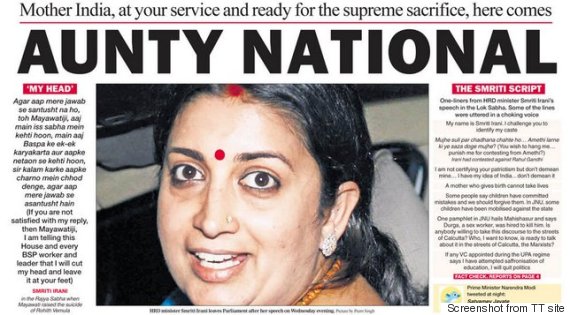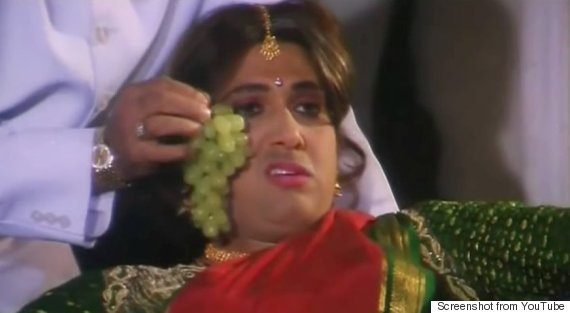Seriously, what's wrong with being an aunty?
In its most innocuous form, 'aunty' is a word widely used, especially by us Indians, to refer to a woman a few decades older than us. Its usage in everyday conversations is also partially rooted in the patterns of communication in Indian regional languages. So our 'masi', 'bua', 'chachi' etc all become 'aunty' when spoken to or spoken about in English. The bottomline is, the word 'aunty', in its truest form is not a ridicule. It is in fact, rooted in respect for a certain age group of women. Unlike a lot of 'insults' hurled at women - sluts, whore, gold-digger, etc - this word has a widely used male counterpart too, 'uncle' that is.
People my age have grown up calling parents of their peers 'aunty' and 'uncle'. My colleagues' and friends' toddlers call me aunty. Aunty, in itself, was not meant to be an insult.
However, since everything about women is prone to relentless, ridiculous stereotyping, another implication of the word 'aunty' emerged. And this spurious 'aunty' was meant to be an insult--and what is a better insult in a stifling parochial society than suggesting that a woman is undesirable? In a society obsessed with sexualising women, 'aunty' became the anti-thesis of 'item', yet another object weighed and labelled by desirability.
Aunty, the everyday moniker, is a product of the better values of our society. Aunty, the insult, is the product of misogyny.
The latter is what The Telegraph today used in its headline while trying what they must have thought was a clever pun on the word 'Anti-national'. With a comical picture of Smriti Irani looking annoyed, the headline read, "Aunty National".
![smriti irani tt]()
The paper, which has had a great recent run with impactful front pages, played right into the hands of the misogynistic narratives they would normally protest. Here they had Smriti Irani, who has now bungled more than just once in dealing with sensitive issues and has become the poster-girl of what is wrong with the 'right' in India. From her stand on Rohit Vemula's suicide to her angry posturing invoking Bharat Mata and labelling JNU students anti-national, Irani is under fire for valid reasons. However, of all her flaws, The Telegraph chose to make an insinuation at her age, as if somehow growing older were a crime or choice. Smriti Irani shouldn't be critiqued for being an 'aunty', she should be critiqued for being an ineffective education minister.
And as soon as The Telegraph used the word 'aunty' as a flippant, churlish accusation, one half of the country rushed to defend Irani against the imagined terrors of aunty-dom. How dare they call her an 'aunty', we scowled. But here's what I am unsure of--is being an 'aunty' a bad thing? Nope. Even in its implications as a 'ridicule', 'aunty' roughly refers to a woman whose physical attributes are not supermodel-esque, who dresses traditionally, stays at home and isn't straight out of the pages of Vogue or a Bollywood party number. Now, what's wrong with being that person too?
That a chorus of patriarchal voices insist such a person is dowdy or undesirable shouldn't be of any consequence to anyone who is better informed than them. Misogynists would even call a woman in contrast to an aunty, a slut when its convenient for them. Should we break our heads over how the voices of patriarchy, best articulated by roadside harassers, describes and labels us? No.
![govinda in aunty no 1]()
Aunty is not essentially Govinda in drag.
The moment we flinch and cry foul over being called an 'aunty', we actually end up reacting to the patriarchal definition of the word. In the process, we also unwittingly dignify such hasty and vicious stereotyping of women with an acknowledgement it doesn't deserve. We will feel insulted by being called an 'aunty' only if we believe what misogynists want us to believe aunties are.
Aunty is not Govinda in drag. Aunty is your mother, your grandmother, your friend's mother, the hardworking woman you buy veggies from, the teacher who taught you to write. Aunty is you, your classmate, your best friend, to those friends' children, the children you teach in school, the neighbours' kid whose frisbee keeps landing in your garden.
When a Telegraph insists the word's an insult, we should point out to them, it's not. Instead of shouting, "we aren't aunties", we should turn around an ask, how is calling someone 'aunty' valid criticism?
Aunty is not essentially Smriti Irani, obsessed with jingoism, blind to the basic freedoms of a democracy, ally to a increasingly insecure party.
Actually, let's pick the right issue to outrage over: not why Smriti Irani was called an aunty, but why aunties were called Smriti Irani.
Disclaimer: HuffPost India is published in association with The Times of India Group, whose newspapers compete with The Telegraph in some markets.
Also see on HuffPost:
In its most innocuous form, 'aunty' is a word widely used, especially by us Indians, to refer to a woman a few decades older than us. Its usage in everyday conversations is also partially rooted in the patterns of communication in Indian regional languages. So our 'masi', 'bua', 'chachi' etc all become 'aunty' when spoken to or spoken about in English. The bottomline is, the word 'aunty', in its truest form is not a ridicule. It is in fact, rooted in respect for a certain age group of women. Unlike a lot of 'insults' hurled at women - sluts, whore, gold-digger, etc - this word has a widely used male counterpart too, 'uncle' that is.
People my age have grown up calling parents of their peers 'aunty' and 'uncle'. My colleagues' and friends' toddlers call me aunty. Aunty, in itself, was not meant to be an insult.
In a society obsessed with sexualising women, 'aunty' became the anti-thesis of 'item', yet another object weighed and labelled by desirability.
However, since everything about women is prone to relentless, ridiculous stereotyping, another implication of the word 'aunty' emerged. And this spurious 'aunty' was meant to be an insult--and what is a better insult in a stifling parochial society than suggesting that a woman is undesirable? In a society obsessed with sexualising women, 'aunty' became the anti-thesis of 'item', yet another object weighed and labelled by desirability.
Aunty, the everyday moniker, is a product of the better values of our society. Aunty, the insult, is the product of misogyny.
The latter is what The Telegraph today used in its headline while trying what they must have thought was a clever pun on the word 'Anti-national'. With a comical picture of Smriti Irani looking annoyed, the headline read, "Aunty National".

The paper, which has had a great recent run with impactful front pages, played right into the hands of the misogynistic narratives they would normally protest. Here they had Smriti Irani, who has now bungled more than just once in dealing with sensitive issues and has become the poster-girl of what is wrong with the 'right' in India. From her stand on Rohit Vemula's suicide to her angry posturing invoking Bharat Mata and labelling JNU students anti-national, Irani is under fire for valid reasons. However, of all her flaws, The Telegraph chose to make an insinuation at her age, as if somehow growing older were a crime or choice. Smriti Irani shouldn't be critiqued for being an 'aunty', she should be critiqued for being an ineffective education minister.
Of all her flaws, The Telegraph chose to make an insinuation at her age, as if somehow growing older were a crime or choice
And as soon as The Telegraph used the word 'aunty' as a flippant, churlish accusation, one half of the country rushed to defend Irani against the imagined terrors of aunty-dom. How dare they call her an 'aunty', we scowled. But here's what I am unsure of--is being an 'aunty' a bad thing? Nope. Even in its implications as a 'ridicule', 'aunty' roughly refers to a woman whose physical attributes are not supermodel-esque, who dresses traditionally, stays at home and isn't straight out of the pages of Vogue or a Bollywood party number. Now, what's wrong with being that person too?
That a chorus of patriarchal voices insist such a person is dowdy or undesirable shouldn't be of any consequence to anyone who is better informed than them. Misogynists would even call a woman in contrast to an aunty, a slut when its convenient for them. Should we break our heads over how the voices of patriarchy, best articulated by roadside harassers, describes and labels us? No.

Aunty is not essentially Govinda in drag.
The moment we flinch and cry foul over being called an 'aunty', we actually end up reacting to the patriarchal definition of the word. In the process, we also unwittingly dignify such hasty and vicious stereotyping of women with an acknowledgement it doesn't deserve. We will feel insulted by being called an 'aunty' only if we believe what misogynists want us to believe aunties are.
When a Telegraph insists the word's an insult, we should point out to them, it's not.
Aunty is not Govinda in drag. Aunty is your mother, your grandmother, your friend's mother, the hardworking woman you buy veggies from, the teacher who taught you to write. Aunty is you, your classmate, your best friend, to those friends' children, the children you teach in school, the neighbours' kid whose frisbee keeps landing in your garden.
When a Telegraph insists the word's an insult, we should point out to them, it's not. Instead of shouting, "we aren't aunties", we should turn around an ask, how is calling someone 'aunty' valid criticism?
Aunty is not essentially Smriti Irani, obsessed with jingoism, blind to the basic freedoms of a democracy, ally to a increasingly insecure party.
Actually, let's pick the right issue to outrage over: not why Smriti Irani was called an aunty, but why aunties were called Smriti Irani.
Disclaimer: HuffPost India is published in association with The Times of India Group, whose newspapers compete with The Telegraph in some markets.
Also see on HuffPost: